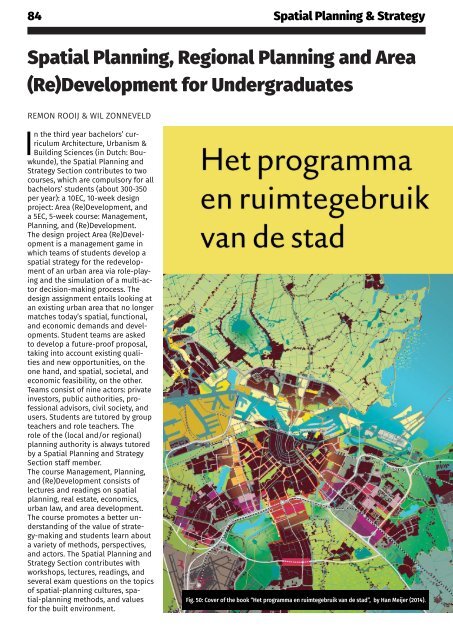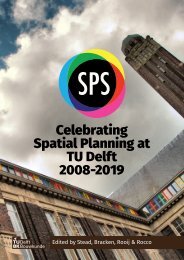*Celebrating Spatial Planning at TU Delft: 2008-2019. Edited by Stead, Bracken, Rooij & Rocco
This is a summary of the achievements of the session Spatial Planning & Strategy of the Department of Urbanism, Faculty of Architecture and the Built Environment, TU Delft, led by Professor Vincent Nadin between 2008 and 2019.
This is a summary of the achievements of the session Spatial Planning & Strategy of the Department of Urbanism, Faculty of Architecture and the Built Environment, TU Delft, led by Professor Vincent Nadin between 2008 and 2019.
Create successful ePaper yourself
Turn your PDF publications into a flip-book with our unique Google optimized e-Paper software.
84 <strong>Sp<strong>at</strong>ial</strong> <strong>Planning</strong> & Str<strong>at</strong>egy<br />
<strong>Sp<strong>at</strong>ial</strong> <strong>Planning</strong>, Regional <strong>Planning</strong> and Area<br />
(Re)Development for Undergradu<strong>at</strong>es<br />
REMON ROOIJ & WIL ZONNEVELD<br />
In the third year bachelors’ curriculum<br />
Architecture, Urbanism &<br />
Building Sciences (in Dutch: Bouwkunde),<br />
the <strong>Sp<strong>at</strong>ial</strong> <strong>Planning</strong> and<br />
Str<strong>at</strong>egy Section contributes to two<br />
courses, which are compulsory for all<br />
bachelors’ students (about 300-350<br />
per year): a 10EC, 10-week design<br />
project: Area (Re)Development, and<br />
a 5EC, 5-week course: Management,<br />
<strong>Planning</strong>, and (Re)Development.<br />
The design project Area (Re)Development<br />
is a management game in<br />
which teams of students develop a<br />
sp<strong>at</strong>ial str<strong>at</strong>egy for the redevelopment<br />
of an urban area via role-playing<br />
and the simul<strong>at</strong>ion of a multi-actor<br />
decision-making process. The<br />
design assignment entails looking <strong>at</strong><br />
an existing urban area th<strong>at</strong> no longer<br />
m<strong>at</strong>ches today’s sp<strong>at</strong>ial, functional,<br />
and economic demands and developments.<br />
Student teams are asked<br />
to develop a future-proof proposal,<br />
taking into account existing qualities<br />
and new opportunities, on the<br />
one hand, and sp<strong>at</strong>ial, societal, and<br />
economic feasibility, on the other.<br />
Teams consist of nine actors: priv<strong>at</strong>e<br />
investors, public authorities, professional<br />
advisors, civil society, and<br />
users. Students are tutored <strong>by</strong> group<br />
teachers and role teachers. The<br />
role of the (local and/or regional)<br />
planning authority is always tutored<br />
<strong>by</strong> a <strong>Sp<strong>at</strong>ial</strong> <strong>Planning</strong> and Str<strong>at</strong>egy<br />
Section staff member.<br />
The course Management, <strong>Planning</strong>,<br />
and (Re)Development consists of<br />
lectures and readings on sp<strong>at</strong>ial<br />
planning, real est<strong>at</strong>e, economics,<br />
urban law, and area development.<br />
The course promotes a better understanding<br />
of the value of str<strong>at</strong>egy-making<br />
and students learn about<br />
a variety of methods, perspectives,<br />
and actors. The <strong>Sp<strong>at</strong>ial</strong> <strong>Planning</strong> and<br />
Str<strong>at</strong>egy Section contributes with<br />
workshops, lectures, readings, and<br />
several exam questions on the topics<br />
of sp<strong>at</strong>ial-planning cultures, sp<strong>at</strong>ial-planning<br />
methods, and values<br />
for the built environment.<br />
Fig. 50: Cover of the book “Het programma en ruimtegebruik van de stad”, <strong>by</strong> Han Meijer (2014).




